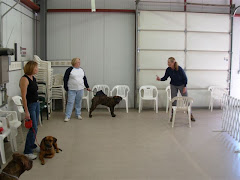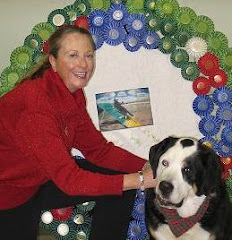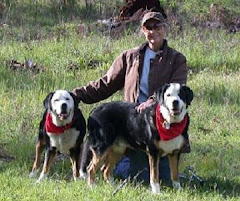
Photo: Older people have thin skin, which is very susceptible to bites and scratches from rambunctious puppies.
Okay, since I am soon to be considered "elderly" myself, I write this with a lump of conscience in my throat. I know I'm making a blanket generalization when I say, "Elderly folks should not have puppies." But, dagnabbit, someone needs to say it. In this case, political incorrectness may save some lives and a lot of heartache, so let's just tell it like it is.
Countless times over the past 20 years, I've been called to senior citizens' homes to help them deal with puppy problems. I try to give each situation the benefit of the doubt, and hope for divine intervention to make the relationships work out. But usually before I leave, we have discussed who will take the dog in the event the elderly owners are no longer able or willing. It's something that needs immediate arrangement, because things can go south pretty rapidly in these situations. There must be a plan in place for who will take the dog, and all parties should be in agreement about this.
It would be much simpler to just encourage elderly friends and relatives to get an older dog instead of a puppy.
All too often, an elderly person will adopt (or be given) an adorable puppy who, at age 7 weeks, loves being held and stroked. That phase usually lasts no more than two weeks. By then the puppy is ready to explore the household, use its teeth on human skin, and learn to "ignore commands" that he hasn't even been taught yet. Add to these the challenges of housebreaking and exercising a young pup, and the problems are compounded.
Elderly people often have very thin skin. Many take blood thinners that compound the problem of minor wounds from puppy teeth. Senior citizens will show me their forearms and wrists as if they're displaying battle scars. They're scratched, bruised and covered in Bandaids, all from wounds inflicted by that cute, playful little puppy. Mind you, every puppy can be taught to avoid common behaviors like play-biting, nipping and jumping up (which can potentially knock an older person to the floor), but training a young dog not to do these things requires fast reactions, an eagle eye, and good hearing. Like it or not, those are not attributes generally assigned to the elderly.
So many "war stories" come to mind...the woman with Alzheimers who forgot she'd left her Dalmation puppy at the boarding kennel...the man who landed in the hospital with infections from puppy-inflicted scratches on his arm...the woman whose large puppy pulled her so hard on the leash that she injured her back...the woman who was repeatedly knocked down by her exuberant Labrador pup....the woman whose pup would never be housebroken because the she wasn't quick enough to catch her in the act or get her outside when necessary...the man whose puppy barked so much that his friends no longer wanted to come visit him.
Older dogs, while challenging at times, do not pose these problems to elderly owners. Older dogs are good for lowering blood pressure; puppies tend to heighten it! Older dogs know the rules or are eager to learn them. They're truly appreciative of the good things in life. They're lower maintenance and more content to just lie next to you and get stroked...like the seven-week-old puppy did for one whole week.
Choose an adult dog instead of a puppy if...
- You are able to walk less than a mile every day at a pace of 18 minutes per mile.
- You are prone to extreme joint or back stiffness
- Your skin tears and bruises easily.
- You have substantial hearing loss and do not wear a hearing aid.
- Your vision is poor.
- Your reactions are slow, as when getting up to answer the phone.
- You have days when you are bedridden or housebound due to ailments.
- You do not have family or friends lined up to take the dog if you're no longer able to care for it..
- You've never had a dog before, or raised one from a puppy.
- You are short on patience.


















1 comment:
Couldn't agree with you more Jan! Many shelters offer a "seniors for seniors" program where seniors can adopt dogs or cats over 7 years of age for a reduced fee or for free. It not only helps seniors find "age appropriate" animals for them but helps the older dogs and cats out there...those that are less likely to be adopted out 'because' of their age...find loving homes.
~Kim
Post a Comment